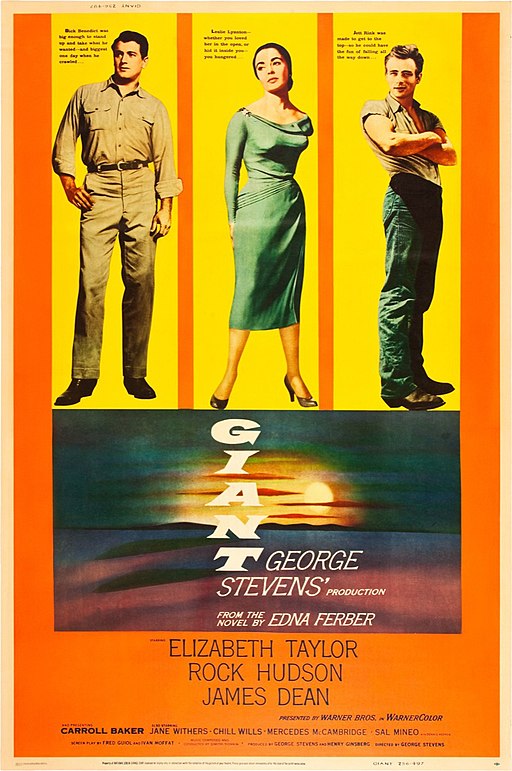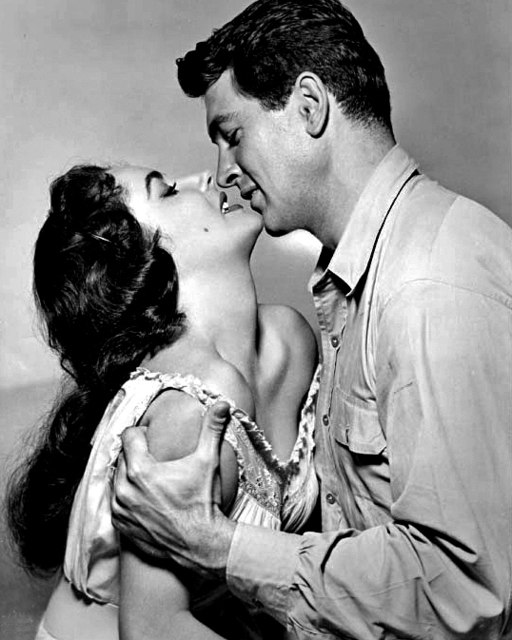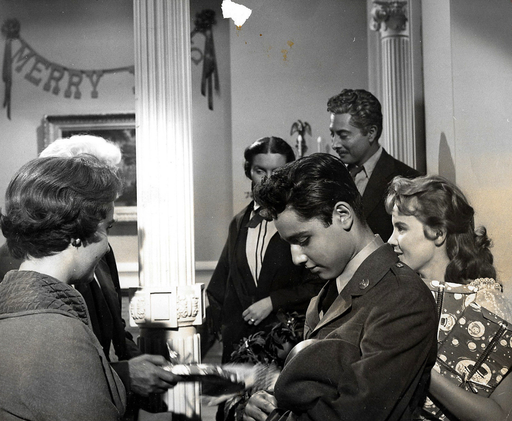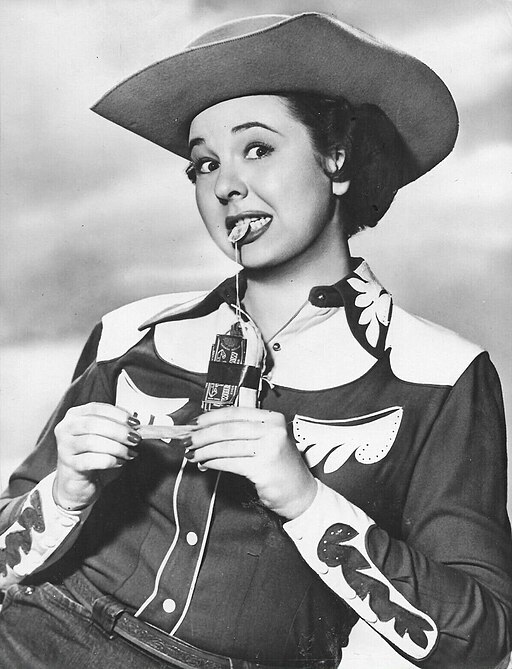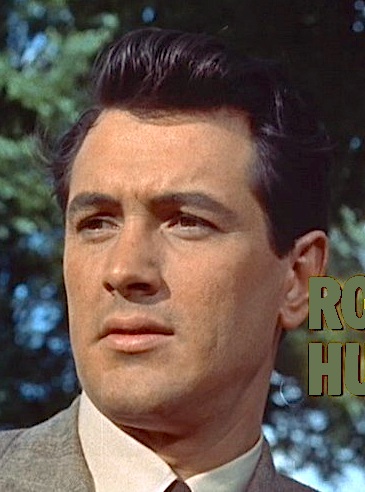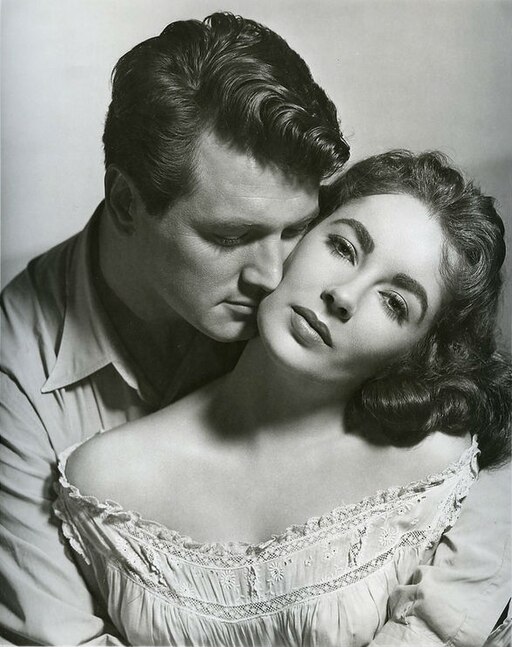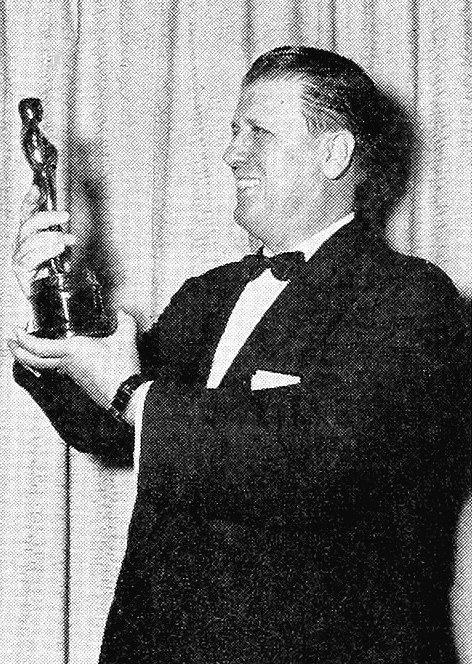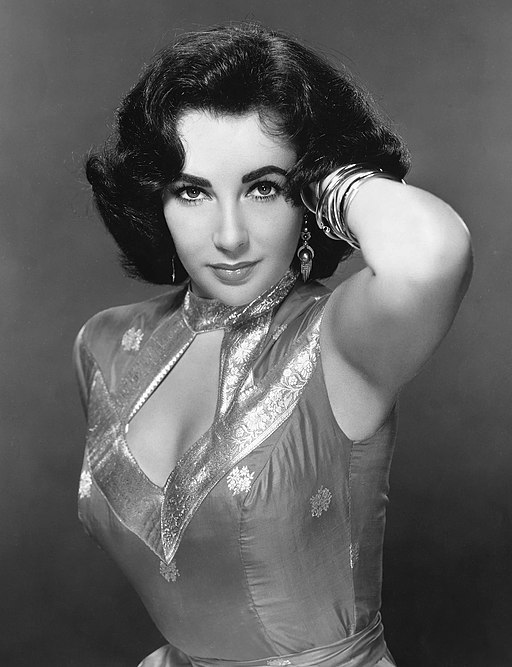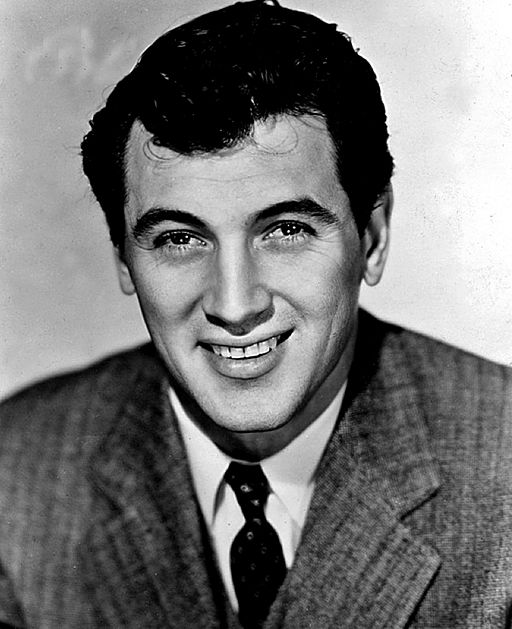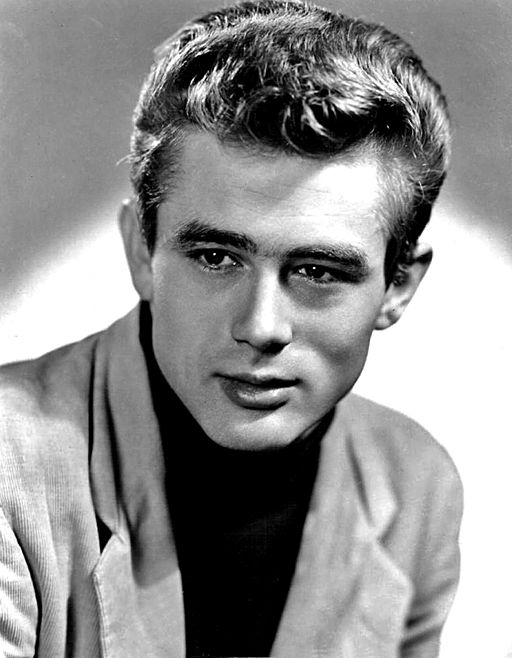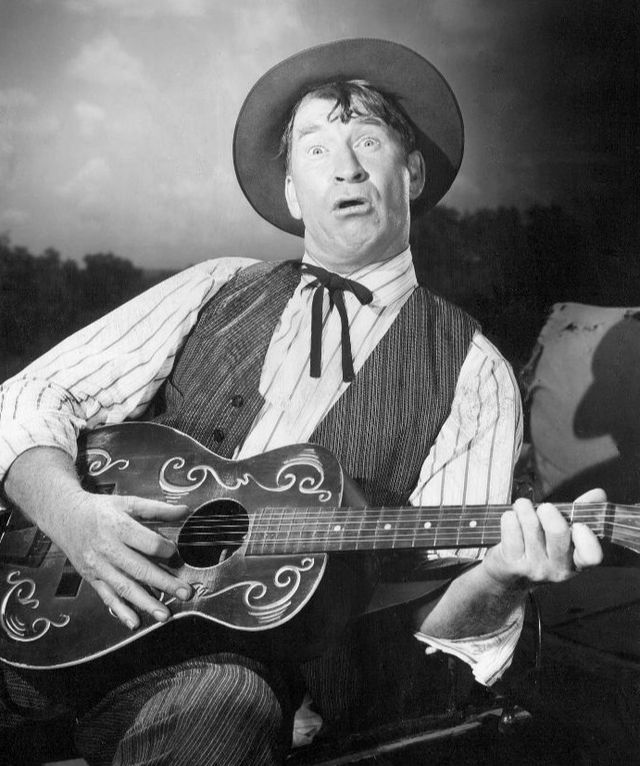Giant - 1956
back| Released by | Warner Bros. |
| Director | George Stevens |
| Producer | George Stevens, Henry Ginsberg |
| Script | Fred Guiol, Ivan Moffat, adapted from the novel by Edna Ferber |
| Cinematography | William C. Mellor |
| Music by | Dimitri Tiomkin |
| Running time | 201 minutes |
| Film budget | $5.4 million |
| Box office sales | $35 million (initial release) |
| Main cast | Elizabeth Taylor - Rock Hudson - James Dean - Caroll Baker - Dennis Hopper |
Giant
A generational saga of love, rivalry, and the changing tides in Texas
"Giant" is a sprawling epic that chronicles the life of wealthy Texas rancher Bick Benedict (Rock Hudson) and his family over two generations.
When Bick marries the refined Leslie (Elizabeth Taylor), she challenges the traditional values of the Benedict ranch, including attitudes towards race and class. The story also focuses on the complex character Jett Rink (James Dean), a ranch hand who becomes an oil tycoon and rises to challenge the Benedicts' wealth and power.
Set against the vast and unforgiving backdrop of Texas's oil fields and cattle lands, the film explores themes of ambition, jealousy, pride, and the seismic shifts in American society. Leslie's progressive views and Jett's unfulfilled love for her add to the personal and social dramas unfolding over the years.
"Giant" serves as a sweeping commentary on the changing social fabric of America, the influence of wealth, and the pursuit of the American Dream. The film's visual grandeur and powerful performances, especially by James Dean in his final role, solidify its status as a classic of American cinema.
Related
Giant – 1956
A complete overview and analysis
"Giant" is an American epic Western drama, helmed by acclaimed director George Stevens, which translates Edna Ferber's novel to the silver screen with grandeur and depth. The film is set against the expansive backdrop of the Texas oil fields and spans over two decades, from the 1920s to the post-World War II era. It centers around the Benedict family, led by the cattle ranching patriarch Jordan 'Bick' Benedict Jr., portrayed by Rock Hudson, and his wife Leslie Lynnton Benedict, played by Elizabeth Taylor.
The narrative opens with Bick's visit to Maryland to buy a horse, where he meets and marries Leslie. They return to the Benedict's sprawling Reata ranch in Texas, where Leslie's progressive views clash with the conservative mindsets of the Benedict family and the local community. The film's sprawling plot encompasses family strife, marital tensions, and the socio-economic transformation from traditional cattle ranching to the burgeoning oil industry, personified by the rise of the surly ranch hand Jett Rink, memorably portrayed by James Dean in his final role.
"Giant" tackled themes of immense social relevance such as class prejudice, racial inequality, and the evolving American Dream, showcasing the societal changes Texas and the wider United States were experiencing. It confronted racism against Mexican Americans and featured a subplot involving the racially motivated mistreatment of a Mexican-American family.
The film's impact was profound due to its ahead-of-its-time social commentary. It was one of the first major Hollywood productions to take a stand on civil rights issues, which was particularly poignant given its 1950s context—a time when such discussions were just beginning to gain momentum in public consciousness.
On a cinematic level, "Giant" solidified George Stevens' status as a master director, adept at both intimate character studies and epic storytelling. The film's sweeping cinematography and the use of Texas landscapes brought the grand scale of the American West to life, influencing the way such stories would be told in future cinematic endeavors. It was also significant for featuring James Dean's last performance; he died in a car accident before the film's release, adding a layer of poignancy and immortalizing his portrayal of Jett Rink.
Commercially successful and critically acclaimed, "Giant" endures as a touchstone in American cinema, reflecting a country on the cusp of change and illustrating the grand potential of film to tackle the broadest themes of human experience within an engaging, emotional narrative.
Full Analysis of the movie “Giant”:
Narrative and Themes
"Giant" unfolds as a multi-generational saga that captures the evolution of a family and the society around it. The narrative structure allows for a deep examination of themes like the shift from rural to industrial lifestyles, the impact of wealth and power, and the clash of cultural values.
- Generational Shifts and Family Dynamics: The film delves into the generational conflict within the Benedict family, highlighting the tension between tradition and progress. Bick represents the old ways of the Texas ranchers, while his children are more aligned with modernity and Leslie’s more liberal perspectives.
- Wealth, Power, and Morality: The discovery of oil brings immense wealth and changes the power dynamics. The film questions the morality of wealth and its ability to corrupt through the character arc of Jett Rink, who rises from poverty to power but loses his integrity along the way.
- Racial Inequality and Social Change: "Giant" was pioneering in its portrayal of racial tensions, depicting the discrimination faced by Mexican Americans and the intercultural relationships. The film's progressive stance reflects the changing attitudes towards race and class in the mid-20th century America.
Characterization
- Bick Benedict (Rock Hudson): His journey from a traditional patriarch to a more progressive figure willing to confront racism highlights the changing American identity.
- Leslie Lynnton Benedict (Elizabeth Taylor): Leslie's character challenges the status quo with her progressive views, acting as a catalyst for change within the family and the community.
- Jett Rink (James Dean): A symbol of unbridled ambition, Rink’s tragic character illustrates how wealth can isolate an individual and lead to self-destruction.
Direction and Cinematography
- George Stevens’ Direction: Stevens balances the intimate personal dramas with grand sweeping shots of the Texas landscape, juxtaposing the emotional with the epic.
- Visual Storytelling: The cinematography captures the vastness of the Texas plains, which becomes a character itself, representing both opportunity and isolation.
Cultural Impact and Legacy
"Giant" is not only a landmark film for its storytelling but also for its cultural commentary. It stands as a testament to Hollywood's power to reflect and influence social issues. The film resonates with viewers even decades later due to its timeless themes and characters that embody the American spirit's complexities.
Performances
The performances are a critical aspect of "Giant’s" enduring appeal. Rock Hudson's portrayal of Bick is nuanced, capturing a man torn between his upbringing and his sense of justice. Elizabeth Taylor shines as Leslie, bringing a sense of strength and modernity. James Dean's Jett Rink is a performance filled with intensity and foreboding, showcasing the vulnerability beneath the ambition.
Technical Aspects
The technical execution of "Giant," from the set design to the costumes, effectively transports the audience to the time and place of the story. The aging makeup used on the characters was innovative for its time and played a crucial role in maintaining continuity over the film's sprawling timeline.
Conclusion
"Giant" is a cinematic tapestry that weaves together personal drama with broader societal themes. It is a movie that is epic in scale yet intimate in detail, with characters that embody the changing American landscape. Its exploration of wealth, power, and race, combined with powerful performances and masterful direction, ensures its place in the pantheon of classic American cinema.
Complete cast of “Giant”:
- Elizabeth Taylor as Leslie Lynnton Benedict
- Rock Hudson as Jordan "Bick" Benedict Jr.
- James Dean as Jett Rink
- Carroll Baker as Luz Benedict II
- Jane Withers as Vashti Snythe
- Chill Wills as Uncle Bawley
- Mercedes McCambridge as Luz Benedict
- Dennis Hopper as Jordan "Jordy" Benedict III
- Sal Mineo as Angel Obregón II
- Rod Taylor as Sir David Karfrey
- Judith Evelyn as Mrs. Nancy Lynnton
- Earl Holliman as "Bob" Dace
- Elsa Cárdenas as Juana Guerra Benedict
- Paul Fix as Dr. Horace Lynnton
- Alexander Scourby as Old Polo
Analysis of George Stevens’ direction of “Giant”:
George Stevens' direction of "Giant" is notable for its sweeping storytelling and ambitious scale, tackling themes such as racism, class, and family legacy within the grand context of the changing American West. His handling of the film exhibits a careful balance between the epic and the personal, a signature of Stevens' directorial style.
Visual Storytelling
Stevens utilized the wide vistas of Texas to full effect, capturing the vastness of the landscape with wide, lingering shots that emphasize the grandeur and isolation of the ranch life. This visual style not only serves to situate the narrative in a very tangible place but also mirrors the overarching theme of transformation as the land itself becomes a character in the story.
Character Development
Under Stevens’ direction, the characters in "Giant" undergo significant development, reflecting broader social changes. He guides the characters through decades of their lives, showcasing their growth and how they grapple with personal and societal issues. The nuanced performances, especially of Elizabeth Taylor, Rock Hudson, and James Dean, bear witness to Stevens' ability to elicit complex characterizations from his actors.
Handling of Themes
Stevens does not shy away from difficult subjects, such as racism against Mexican Americans, and the struggle between tradition and modernity. His direction ensures these themes are woven into the fabric of the narrative, allowing them to emerge organically through interactions and conflicts.
Pacing and Structure
The film spans over two decades, a challenge which Stevens meets by controlling the pacing carefully, allowing the story to unfold gradually without losing the audience's interest. This is particularly evident in how the film deals with the passage of time, marked by the characters' aging, the evolving landscape, and the shift from cattle ranching to oil drilling.
Use of Symbolism
Stevens' use of symbolism is subtle yet impactful. For instance, the character of Jett Rink, portrayed by James Dean, represents the new, ruthless capitalism that stands in contrast to the Benedicts' traditional, land-based wealth. The oil that ultimately gushes from the ground is not just a source of wealth but a symbol of the seismic shifts in values and power structures.
Collaboration with Actors
Stevens is known for his actor-centric approach. The legendary final performance of James Dean (who died before the film's release) as Jett Rink is a testament to Stevens' ability to draw out a seminal portrayal from an actor. The depth and intensity of Dean’s performance, as well as the complex, multifaceted portrayals by Taylor and Hudson, demonstrate Stevens’ skill in directing actors to realize their characters' full potential.
In "Giant," George Stevens crafted not just a film but a piece of Americana that tackles the myths of the West, the nature of wealth, and the quest for identity. His direction ensures that while the film operates on the scale of the epic, it remains a profoundly human story at its heart. His subsequent Academy Award for Best Director was a recognition not just of the film's ambition, but of Stevens’ adeptness at marrying scope with intimate storytelling.
Remarkable quotes from the film “Giant”:
- Bick Benedict: "You should have shot that fellow a long time ago. Now he's too rich to kill."
- Leslie Benedict: "Money isn't everything, Jett." Jett Rink: "Not when you've got it."
- Leslie Benedict: "It's been my experience that the people who talk most about the way they want to die are the ones who are least ready to go."
- Jett Rink: "I'm rich, Bick. I'm a rich 'un. I'm a rich boy. Me, I'm gonna have more money than you ever thought you could have - you and all the rest of you stinkin' sons of... Benedicts!"
- Leslie Benedict: "If you want to build something, build a better mouse trap. Or a better world."
- Jett Rink: "You sure do look pretty, Miss Leslie. Pert'near good enough to eat!"
- Bick Benedict: "You know something, Leslie, I doubt if there's a person in the world who'll ever be able to tell you what to do."
- Bick Benedict: "There's one thing you got to admire about the old boy. He sure has got a lot of want to him."
- Bick Benedict: "We're all proud of our state; but, Jordy, you don't love it for its size. That'd be like loving a woman for her—well, for her statistics."
Analysis of the performance of Elizabeth Taylor as Lynnton Benedict:
Elizabeth Taylor's role as Leslie Lynnton Benedict in "Giant" is one of the central pillars of the film, showcasing her talent for capturing complex characters and adding depth to the narrative. Her performance is often heralded as one of the highlights of her early career, and here's a more detailed analysis:
Strength and Independence
Taylor's portrayal of Leslie is marked by her character's strength and independence. Arriving in Texas as an outsider, Leslie is quick to challenge the established norms and expectations of her new family and community. Taylor embodies this progressive spirit with a sense of dignity and resilience, positioning Leslie as a quietly defiant counterpoint to the traditional gender roles of the time.
Cultural Clash and Adaptation
As a character, Leslie serves as the lens through which the audience experiences the cultural clash between the refined East Coast society and the rough-edged Texas ranching world. Taylor adeptly navigates Leslie's adaptation to her new life, infusing the character with a blend of grace and tenacity. Her performance underscores Leslie's influence on her family's values and their evolving attitudes towards race, class, and privilege.
Romantic and Familial Dynamics
The nuanced dynamics between Leslie and her husband, Bick Benedict (played by Rock Hudson), are central to the film. Taylor's portrayal reflects the complexities of their marriage — from passionate love to profound disagreement, particularly on issues like racism and modernity. Her interactions with Bick showcase Leslie's role not just as a partner but as a conscience and catalyst for change.
Moral Compass
Taylor's Leslie is often the moral compass of the film, standing up against injustices she witnesses, such as the mistreatment of Mexican-American families. Taylor manages to convey a sense of moral clarity and empathy without resorting to preaching, making Leslie a compelling and endearing figure.
Evolution Over Time
Throughout the film, Leslie evolves from a young, idealistic bride into a matriarch who has weathered personal and societal storms. Taylor's performance captures this passage of time not only through aging makeup but also through the subtle shifts in her demeanor, the maturity in her voice, and the wisdom apparent in her eyes.
Contrast to Jett Rink
Leslie's character is often contrasted with Jett Rink (James Dean), representing the opposing force to his unchecked ambition and the changing face of Texas. Taylor's scenes with Dean are charged with a complex mix of emotions, from disdain to pity, and she skillfully navigates the undercurrents of their relationship.
Analysis of the role of Jett Rink played by James Dean:
James Dean's role as Jett Rink in "Giant" stands out as one of his most iconic performances, made all the more poignant by his tragic death before the film's release. In the role of Jett, Dean delivers a complex character study that is both magnetic and melancholic. Here's an in-depth analysis of his portrayal:
Ambitious Outsider
Dean's Jett is an embodiment of the ambitious outsider. He starts as a lowly ranch hand, often looked down upon by the wealthier Benedict family, but harbors dreams of striking it rich and gaining power. Dean channels a raw determination mixed with a sense of inferiority and resentment, capturing the essence of a man who feels he has been wronged by his social standing.
Volatile and Enigmatic Presence
Jett Rink is characterized by his volatility and enigmatic charm. Dean portrays these qualities with an unpredictable energy that keeps the audience and the other characters off balance. His performance is electric, often shifting between quiet intensity and explosive emotion, which serves to make Jett an unpredictable and fascinating character.
Symbol of Change
Dean's character represents the changing face of Texas, from traditional cattle ranching to oil drilling. Jett's success in striking oil becomes a symbol of modernity clashing with the old ways, and Dean captures this transformation with a layered performance that reflects both the arrogance of newfound wealth and the isolation it brings.
Physicality and Method Acting
Dean was known for his method acting approach, and he brings an impressive physicality to the role of Jett. He walks with a swagger that denotes both confidence and a chip on his shoulder. Even as he ages throughout the film, Dean's body language evolves, reflecting Jett's journey from youthful ambition to bitter solitude.
Complex Relationships
The relationships Jett has with other characters, particularly with Leslie Benedict (Elizabeth Taylor) and Bick Benedict (Rock Hudson), are fraught with complexity. Dean's portrayal of Jett's interactions with Leslie is particularly nuanced, as he conveys a mix of admiration, desire, and a deep-seated sense of rivalry with her husband. The push and pull of this relationship adds a rich layer to the film.
The Downfall of Success
Perhaps one of the most compelling aspects of Dean's performance is his depiction of Jett's downfall. Despite achieving immense wealth, Jett remains a lonely figure, and Dean's portrayal in the latter part of the film is haunting. His success does not bring happiness, and Dean's ability to express this emptiness is a testament to his talent as an actor.
Tragic Hero
Dean's Jett Rink is a tragic hero in the classical sense. His flaws and hubris lead to his downfall, and Dean imbues the character with a sense of tragedy that resonates with viewers. The last scenes of Jett, drunk and stumbling at his own banquet, is a masterful depiction of a man who has gained the world but lost his soul.
In "Giant," James Dean solidifies his legacy as a screen icon. His performance as Jett Rink is a testament to his ability to deeply understand and portray complex, tortured characters. Dean captures the essence of the American dream turned sour, and his portrayal of Jett Rink remains a defining moment in cinematic history.
Analysis of the performance of Rock Hudson as “Bick” Benedict Jr.:
Rock Hudson's role as Jordan "Bick" Benedict Jr. in "Giant" is central to the film's exploration of themes such as familial duty, the clash between old and new worlds, and the challenge of personal growth in the face of changing social mores. Here's an in-depth analysis of his portrayal:
Stalwart Patriarch
Hudson's Bick represents the traditional, stoic Texan archetype. He is initially the embodiment of conservative values, steadfast in his ways and committed to preserving the legacy of the expansive Reata ranch. Hudson imbues Bick with a dignified strength and an air of authority that is typical of a patriarchal figure of the time.
Transformation and Growth
One of the most compelling aspects of Hudson's performance is the transformation his character undergoes. From a man who passively accepts the social and racial prejudices of his time, Bick grows to challenge these views. Hudson skillfully portrays this evolution, showing Bick's initial discomfort and eventual courage as he confronts his own biases.
Complex Relationships
The dynamic between Bick and his wife, Leslie (Elizabeth Taylor), is pivotal. Hudson's interactions with Taylor bring to light Bick's complexities; he is a loving husband and father but also a man bound by tradition. Hudson captures the tension between Bick's affection for Leslie and his frustration with her challenging of the status quo.
Rivalry and Resentment
Hudson's portrayal of Bick's rivalry with Jett Rink (James Dean) is laced with subtlety and nuance. He encapsulates the disdain and jealousy Bick feels towards Jett, whose rise threatens the established order that Bick represents. Hudson skillfully conveys this tension, never fully boiling over into outright confrontation, but always simmering beneath the surface.
Changing Ideals of Masculinity
Throughout the film, Bick's sense of masculinity is challenged, whether it's through his interactions with Jett or his progressive son. Hudson shows Bick's struggle to adapt, ultimately portraying a man who is learning to redefine what it means to be strong and to lead. The shift from a domineering figure to a more understanding and supportive patriarch is a significant arc that Hudson handles with grace.
Moral Center
Despite his flaws, Bick is portrayed by Hudson as the moral center of the film. His journey is one of the most significant in terms of character development, and Hudson ensures that Bick's inherent goodness is not lost amidst his initial ignorance and stubbornness.
Legacy and Loss
Hudson captures the melancholy of a man watching the world he knows change rapidly, potentially rendering him obsolete. The loss of his son's interest in the ranch, the rise of the oil industry, and the shift in social attitudes all weigh heavily on Bick, and Hudson conveys this sense of loss with a poignant understatement.
Rock Hudson's performance in "Giant" is a defining role in his career, showcasing his ability to navigate complex emotional territory and reflect the changing American landscape of the time. His Bick Benedict is a multifaceted character whose personal growth reflects broader societal changes, and Hudson’s portrayal is a significant part of what makes "Giant" an enduring classic.
Awards and Nominations for the movie “Giant”:
"Giant" (1956) received a significant amount of critical acclaim and was recognized with several awards and nominations, particularly at the 29th Academy Awards. Here's an overview of its achievements:
Awards Won:
- Academy Award for Best Director: George Stevens
- Golden Globe for Best Director: George Stevens
Academy Award Nominations:
- Best Picture: The film was nominated but did not win; the award went to "Around the World in 80 Days."
- Best Actor: James Dean (posthumously) was nominated for his role as Jett Rink. This nomination was historic as it was the first official posthumous acting nomination in Academy Awards history.
- Best Supporting Actress: Mercedes McCambridge for her role as Luz Benedict.
- Best Adapted Screenplay: Fred Guiol and Ivan Moffat were nominated for their screenplay based on Edna Ferber's novel.
- Best Art Direction (Color): Boris Leven and Ralph S. Hurst were recognized for their work in Art Direction.
- Best Costume Design (Color): Moss Mabry and Marjorie Best were nominated for their costume design.
- Best Film Editing: William Hornbeck was nominated for his editing work.
- Best Original Score: Dimitri Tiomkin received a nomination for his score for the film.
Other Awards and Nominations:
- BAFTA Awards: "Giant" received a nomination for Best Film from any Source.
- Directors Guild of America Award: George Stevens won the DGA Award for Outstanding Directorial Achievement in Motion Pictures.
Legacy:
- AFI's 100 Years... 100 Movies: "Giant" was ranked #82 on the American Film Institute's 2007 list of the greatest American films of all time.
- National Film Registry: In 2005, "Giant" was selected for preservation in the United States National Film Registry by the Library of Congress as being "culturally, historically, or aesthetically significant."
"Giant" was the last film James Dean starred in before his untimely death, which also added to the film's historical significance. Despite not sweeping the Oscars, the nominations and the win for George Stevens solidified the film's place as a classic in American cinema.

